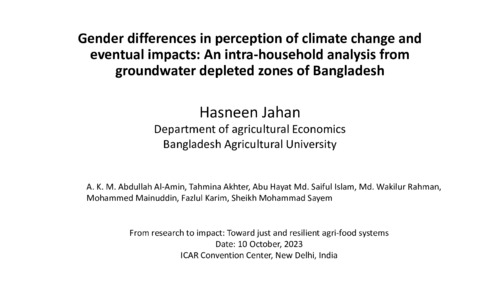Gender differences in perceptions of climate change and eventual impacts: An intra-household analysis from groundwater depleted zones of Bangladesh
Abstract
Given the importance of gender in household and agricultural decision-making including climate change adaptation and mitigation decisions, understanding within-household gender differences in perception of climate change and its eventual impacts is crucial to formulate and design relevant policies and programs. Therefore, aiming at a more nuanced gender analysis, this study attempted to measure within-household gender differences in perception of climate change its impact and explored the factors affecting such perceptions. We drew on empirical data obtained from farm-household surveys conducted on 360 codwelling couples from three dissimilar drought-prone areas of northwest Bangladesh. Findings reveal that the significant difference in spouses’ perceptions of unexpected rainfall and thunderstorms was perceived more by wives than husbands; nevertheless, increasing temperature was perceived more by husbands than wives. Similarly, spouses perceived that climate change has negative effects on agriculture and livelihoods. There were significant spatial differences in the responses across husbands and wives. The discrete choice modeling approaches employed to explore the determinants of perceptions by husbands and wives illustrated that wives living in high-water-scarce areas and medium-water-scarce areas with higher education and age were more likely to perceive climate change and its eventual impacts, whereas husbands’ age and education were negatively allied with their perceptions. Intrahousehold gender-differentiated perceptions suggest that policy interventions should provide gender-disaggregated targeted human-capital development, extend institutional facilities, and support appropriate farm-level spatial program design and policy formulation.

